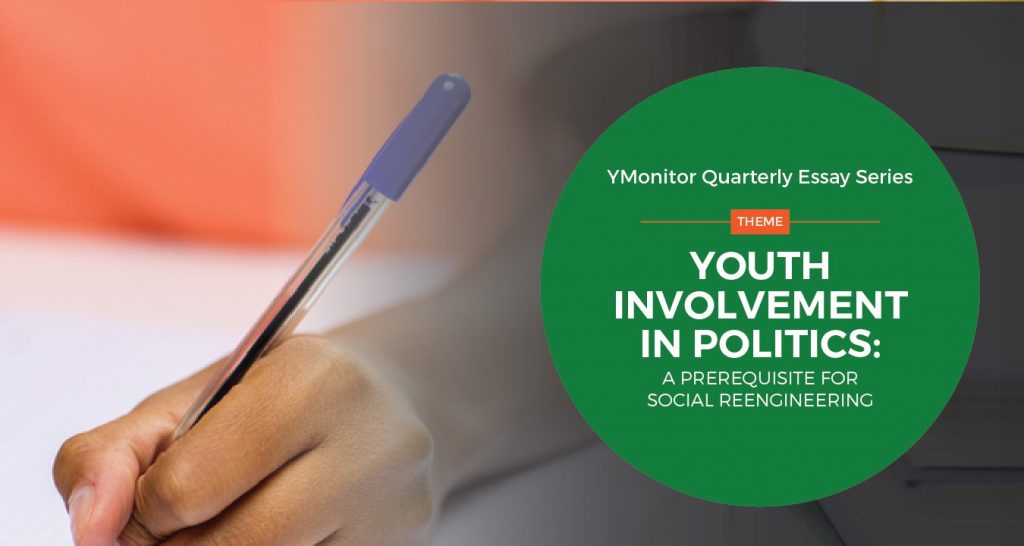by Damola Mewojuaye
When thinking about the involvement of young people in today’s Nigerian politics, one is quickly faced with a paradox.
Arenas for youth participation in politics appear to be more numerous than ever before, yet few would claim that these opportunities have resulted in the widespread and effective involvement of young people. How do we go about effecting positive changes in our society when the major catalyst, that is the youth represent insignificant number among the governing body that has decisional and executive power? If this is true of our nation’s politics, then we need to address why it is imperative and a must for the youth of this country to be actively involved in politics.
The youths are the ones who have the greatest power in changing the arena of the social environment, since they represent immutable voice of the majority of the population. Also, in order to avoid a generational gap, it is up to them to inherit the will of the of the older generation while also focusing on the part that will better the course of humanity. In other words, youth involvement in politics goes beyond political engagement but leads to civic engagement.
Understanding the modern-day political democracy will help make this point clearer. The advent of political democracy only considered major issues of internal order, external defense and fiscal stability. Political decision making was based on a narrow social stratum, usually consisting of bourgeois and aristocratic notables, while broad sections of society were excluded. But dual growth in issues and social bases of politics resulted in the gradual expansion of the social bases of politics which could only be accommodated by having ever-wider variety of social pluralism, especially the youth at the forefront of politics in order to transform their environment.
Secondly, knowledge has always played a significant role in the course of human history as it is a key factor that influences the political arena. And if we are going to get the best in terms of state-society relationship, priority must be given to youths participating in politics. More and more ideas are generated by the youths and they are responsible for choosing which extant cultural beliefs would benefit humanity.
As good as experience is vital in effecting any change, a man of knowledge and vision will always get tremendous results beyond the norm and the Nigerian youth have the knowledge and vision required to make this nation a better society through the instrumentality of politics.
It is also important to know that social capital and trust, political culture and citizenship are in one way or another, social conditions that make democracy and institutions thrive. In other words, democracy will remain feeble in our country unless we generate broad and lasting legitimacy because the vitality of any institutions depends on the extent to which they are accepted and embraced by the society at large. Legitimacy is most generally the belief that democracy is a valuable political and social arrangement. Our country is faced with notable problems of legitimacy due to inability of the government to provide for basic social needs such as welfare and security which is generally rooted in lack of connection between the political class and citizen.
The only way out of this problem is unbiased democracy that favours participation of youths since they represent a large percentage of the populace and can therefore make decision that will generally influence all, unlike decisions that favours the elite, politicians, educated and affluent social groups.
Youth participation in politics will also help to produce better citizens. Young people who get involved early in politics are more likely to become engaged citizen.
In conclusion, it is obvious from the aforementioned reasons that youth involvement in politics is a prerequisite for social engineering and plays a crucial role for the development of our nation. In an institution-building capacity, the quest for democratic involvement of varied social groups has been a powerful driver behind the described expansion of democratic politics.
It is the establishment of institutional channels to accommodate an ever-widening variety of social pluralism, especially the youth that can bring about the true change we desire in our nation. Since youths represent a large number of the population(over 65%), it is therefore true that democracy in this nation can only be a tool for both political and social change if only they are allowed to participate in politics. In other words, the only way to re-engineer the retarded political structure and democratic practices of our nation, which have resulted to many problems in our society, from corruption to insecurity, is to put in place effective policies that will foster a fully-fledged democratic culture that strongly legitimizes and fortifies youth involvement in politics.
